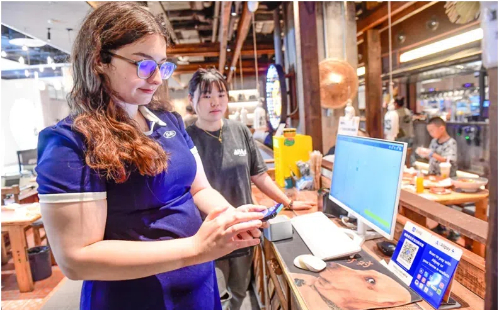BEST launches new logistics service
Trade between China and Southeast Asia continues to surge during COVID-19
As presales for the Double 11 shopping festival-China's most iconic annual online and offline shopping gala-have already kicked off in October, BEST Inc, a Hangzhou, Zhejiang province-based integrated supply chain and logistics solutions provider, has launched a cross-border logistics service to help consumers in Southeast Asian countries purchase goods from Chinese e-commerce platforms.
With this service, customers in Thailand, Vietnam, Singapore, Malaysia and Cambodia are able to place more than one order at different shopping websites or stores in China, with freight for only one consolidated parcel. The price starts from 7 yuan ($1.1) per kilogram.
The new service is designed to meet the needs of overseas Chinese in Southeast Asia, where China's major shopping websites such as Taobao, JD and Pinduoduo are getting increasingly popular.
"For many years, the Double 11 shopping festival is the time when I buy New Year clothes online. It is not possible for shopping malls to have as many styles as shopping websites boast," said Peny Chin from Malaysia, who has added dozens of fashion items to her cart.
After the orders are confirmed, her items will first arrive at one of BEST's warehouses in southern China and later get consolidated into a big parcel. These goods, after Customs clearance in Malaysia, can be delivered to Chin's apartment in Kuala Lumpur as early as the next day.
As the expected implementation of the Regional Comprehensive Economic Partnership agreement next year will widen trade flows and consolidate the supply chain network in the Asia-Pacific region, exploring business in economies of the Association of Southeast Asian Nations is in line with the trend that trade between China and the regional bloc has continued to surge after the outbreak of the COVID-19 pandemic, said Johnny Chou, BEST's chairman and CEO.
The RCEP pact is a free trade agreement concluded in November between the 10 member states of ASEAN-Brunei, Cambodia, Indonesia, Laos, Malaysia, Myanmar, the Philippines, Singapore, Thailand and Vietnam-and five of its FTA partners, namely Australia, China, Japan, New Zealand and the Republic of Korea.
Supported by 7,000 employees, BEST's global business continued its growth momentum with parcel volume in Southeast Asia increasing 140.7 percent year-over-year in the second quarter, bucking the resurgence of the COVID-19 pandemic in the region, said its fiscal report released in August.
"Given the supportive industry regulatory environment and continued strong e-commerce growth, we are optimistic that our strategic refocusing plan will position us to deliver improved operating and financial results in the coming quarters," Chou said.
ASEAN continued to be China's largest trading partner in the first three quarters, with bilateral trade reaching 4.08 trillion yuan, up 21.1 percent year-on-year, accounting for 14.4 percent of China's total foreign trade, China's General Administration of Customs said.
Driven by fast-growing new formats and models of foreign trade such as cross-border e-commerce, big data technologies and tools like digital payments and online exhibitions, the Chinese company began express services in Thailand, Vietnam, Malaysia, Singapore and Cambodia, and started cross-border logistics service from China to the five nations in 2020.
As it runs last-mile delivery in Southeast Asia, Chou said customers are able to track their orders or parcels throughout the whole procedure on their smartphones.
Apart from building more overseas warehouses in signatory states of the RCEP pact in the coming years, Chou said the New York Stock Exchange listed company has built overseas warehouses in Southeast Asian markets, as well as export transshipment warehouses in China.
The Chinese company currently operates 16,000 square meters of overseas warehouses in five Southeast Asian economies including Thailand and Malaysia, and more than 26,000 stock keeping units. It handles more than 11,000 orders per day, and provides services to domestic and global companies from chemical and home appliance industries.
"Building overseas warehouses and conducting cross-border e-commerce businesses can stimulate consumption of quality products. They are also practical solutions to strengthen China's dual-circulation growth paradigm in both exports and imports," he said.
Under the dual-circulation model, the domestic market is the mainstay while the domestic and foreign markets reinforce each other.
BEST's data showed the top categories Southeast Asian residents consume are clothing, household products, electronic gadgets and food. In addition, not only individuals but small wholesalers from Southeast Asia are shopping on China's major e-commerce platforms.
He Jing, a Chinese citizen who lives and works in Bangkok, said he noticed demand for kitchen appliances had soared as the city had a few lockdowns from the contagion last year. He and his wife decided to run an online shop on a local e-commerce shopping platform in Thailand and ordered items such as electric rice cookers and barbecue ovens.
Due to the high quality of these products, he said sales of his store increased by about 10 percent each month this year, and the couple plans to increase product categories by ordering more headwear, nail polish and other accessories from Yiwu, one of China's export centers for small commodities in Zhejiang province.
Amid the pandemic, China's uninterrupted large-scale production has ensured the integrity of the supply and industrial chains, and has contributed to the prosperity of cross-border exports, said He Lin, senior director of BEST Global, a subsidiary of BEST Inc.
Because the increasingly complex international investment environment has presented more difficulties for domestic companies to pursue "going global" strategies, she said the group will help Chinese manufacturers and brands enter Southeast Asia through its advantage on the group's established service networks to support the innovative growth of foreign trade.
The country's cross-border e-commerce has grown nearly tenfold over the past five years. Domestic firms currently run more than 1,900 overseas warehouses and about 130 bonded maintenance projects to process trade across the world, said Li Xingqian, director-general of the foreign trade department at the Ministry of Commerce.
China and ASEAN's industrial foundation and complementary trade structure as well as the RCEP agreement will support the growth of both regional and global trade, cross-border e-commerce and related industries, and create a more stable and open investment environment for global firms investing in their markets in the future, said Zhang Jianping, director-general of the China Center for Regional Economic Cooperation in Beijing.
To boost global trade and stabilize the world's supply chain, the 130th China Import and Export Fair held in Guangzhou, Guangdong province, from Oct 15 to 19 and the fourth China International Import Expo in Shanghai from Friday to Nov 10 have all added online forms to promote the growth of cross-border e-commerce business and application of various digital technologies.

 On board G8388: A high-speed rail loop that connects the Yangtze River Delta region
On board G8388: A high-speed rail loop that connects the Yangtze River Delta region  A look at China's economic data in August
A look at China's economic data in August  Trailer: Journey to Joy
Trailer: Journey to Joy 


